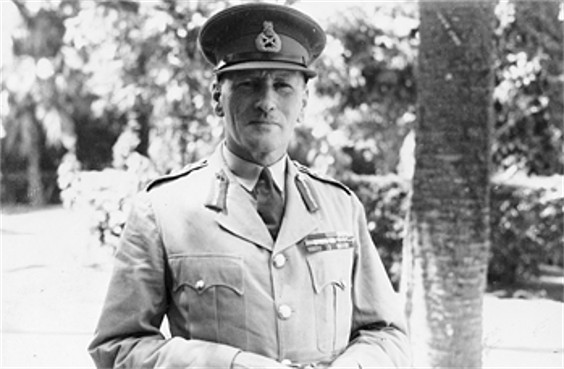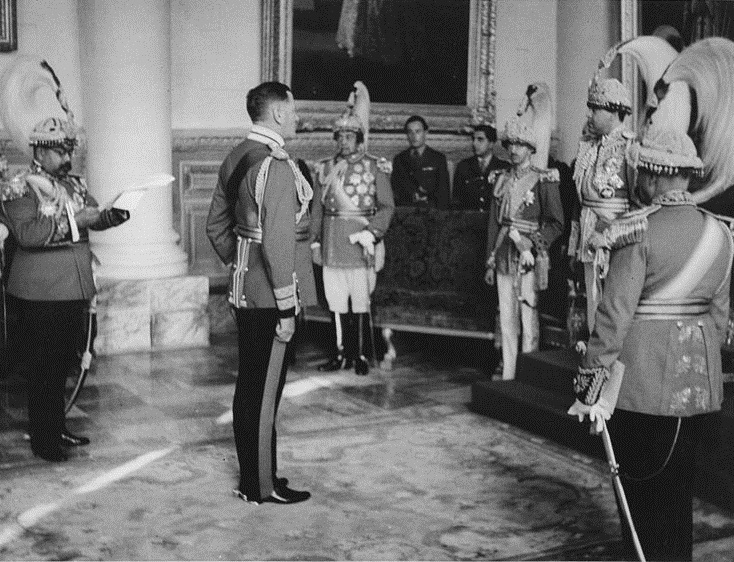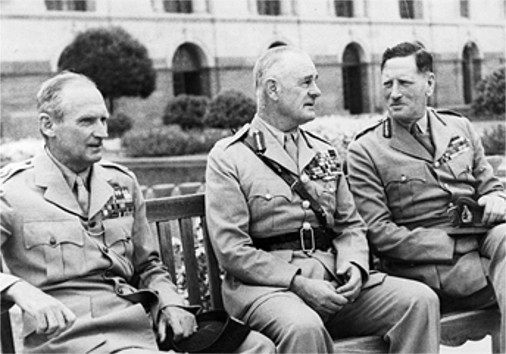<Back to Index>
- Field Marshal of the Indian Army Claude John Eyre "The Auk" Auchinleck, 1884
PAGE SPONSOR

Field Marshal Sir Claude John Eyre Auchinleck (21 June 1884 – 23 March 1981), nicknamed "The Auk", was a British army commander during World War II. He was a career soldier who spent much of his military career in India, where he developed a love of the country and a lasting affinity for the soldiers he commanded. In July 1941 he was appointed Commander in Chief of the Middle East theater; after initial successes the war in North Africa turned against the British, and he was relieved of the post in 1942 during the crucial Alamein campaign. He served thereafter as C-in-C India until his resignation in 1947. He retired to Marrakesh, where he died at age 96.
The Auchinlecks were an Ulster - Scots family from County Fermanagh, where they had settled in the 17th century. Claude Auchinleck was born in Aldershot, son of Colonel John and Mary Auchinleck, while his father's regiment was stationed there. His father died in 1892, when he was eight years old, and Auchinleck grew up in impoverished circumstances, but he was able, through hard work and scholarships, to graduate from Wellington College. After Wellington, he went to the nearby Royal Military Academy, Sandhurst.
Auchinleck joined the Indian Army as an unattached second lieutenant in January 1903 and in 1904 joined the 62nd Punjabis. He learned Punjabi and, able to speak fluently with his soldiers, he absorbed a knowledge of local dialects and customs. This familiarity engendered a lasting mutual respect, enhanced by his own personality. In April 1905 he was promoted to lieutenant and in January 1912 he was promoted to captain.
During World War I, he served in the Middle East in Egypt, Palestine and Mesopotamia. Auchinleck's division was the last of four offered by the Indian government. While en route for France, it was reassigned to defend the Suez Canal from possible Turkish attack. When the attack occurred in February 1915, Auchinleck's regiment prevented the Turks from crossing the canal and he led a successful counter - attack; the Turks subsequently surrendered.
The 6th Indian Division, of which the 62nd Punjabis were a part, was landed at Basra on 31 December 1915 for the Mesopotamian campaign. In July 1916 Auchinleck was promoted Acting Major and made second in command of the regiment. North of Basra, the Punjabis were in heavy action in dreadful conditions: cold, rain and mud as well as determined Turkish defense reduced the regiment to 247 men and Auchinleck took temporary command when his regimental commander was wounded. Further hard fighting ensued: the Turkish army inflicted a humiliating reversal on the British and eventual success was hard won. Auchinleck was mentioned in dispatches and received the Distinguished Service Order in 1917 for his service in Mesopotamia, promoted to major in January 1918 and was also appointed brevet lieutenant colonel in 1919 for his "distinguished service in Southern and Central Kurdistan" on the recommendation of the C-in-C of the Mesopotamia Expeditionary Force.
Auchinleck took a number of practical lessons from his experiences in Mesopotamia. Firstly, soldiers' health and well being was critical to an army's effectiveness and he became convinced of the need of adequate rest, hygiene, good food and medical supplies for the troops. Secondly, he had seen the futility of inadequately prepared attacks against dug-in, well armed defenders and this fueled his later reluctance to initiate precipitate actions advocated by his political and military superiors.
Between the wars, Auchinleck served in India. He was both a student and an instructor (1930 – 1933) at the Staff College at Quetta and also attended the Imperial Defence College. In January 1929 he had been promoted to lieutenant colonel and appointed to command his regiment which had become in the 1923 reorganization of the British Indian Army the 1st battalion, 1st Punjab Regiment. In 1930 he was promoted to full colonel, with seniority backdated to 1923, and in 1933, he was appointed temporary brigadier to command of the Peshawar Brigade, which was active in the pacification of the adjacent tribal areas. A serious operation in the Mohmand area in 1935 led to the first use of tanks in India. Auchinleck was Mentioned in dispatches and received the CSI and CB for his skill in managing the operation.
In November 1935 Auchinleck was promoted to major general and on leaving his brigade command in the following April was on the unemployed list (on
half pay) until September 1936 when he was appointed Deputy Chief of
the General Staff and Director of Staff Duties in Delhi. After this he was appointed to command the Meerut District in India in July 1938. In
1938 Major General Auchinleck was appointed to chair a committee to
consider the modernization, composition and re-equipment of the British Indian Army. The committee's recommendations formed the basis of the 1939 Chatfield Report which outlined the transformation of the Indian Army. It grew from 183,000 in 1939 to over 2,250,000 men by the end of the war.
On the outbreak of war Auchinleck was appointed to command the Indian 3rd Infantry Division but in January 1940 was summoned to the United Kingdom to command IV Corps, the only time in the war that a wholly British corps was commanded by an Indian Army officer. In May 1940 Auchinleck took over command of the Anglo - French ground forces in Norway, a military operation that was doomed to fail. After the fall of Norway, in July 1940 he briefly commanded V Corps before becoming General Officer Commander - in - Chief, Southern Command, where he had an uneasy relationship with his subordinate Bernard Montgomery, the new V Corps commander. Montgomery later wrote
"In the 5th Corps I first served under Auchinleck.....I cannot recall that we ever agreed on anything"
In January 1941 Auchinleck was recalled to India to become Commander - in - Chief of the Indian Army in which position he also was appointed to the Executive Council of the Governor General of India and in April appointed ADC General to the King which ceremonial position he held until January 1947, shortly after his promotion to field marshal.
In April 1941 RAF Habbaniya was threatened by the new pro-Axis regime of Rashid Ali. This large Royal Air Force station was west of Baghdad in Iraq and General Archibald Wavell, C-in-C Middle East Command, was reluctant to intervene, despite the urgings of Winston Churchill, because of his pressing commitments in the Western Desert and Greece.
Auchinleck, however, acted decisively, sending a battalion of the King's Own Royal Regiment by air to Habbaniya and shipping Indian 10th Infantry Division by sea to Basra. Wavell was prevailed upon by London to send Habforce, a relief column, from the British Mandate of Palestine but by the time it arrived in Habbaniya on 18 May the Anglo - Iraqi War was virtually over.
Following the see-saw of Allied and Axis successes and reverses in North Africa, Auchinleck was appointed to succeed General (later Field Marshal) Sir Archibald Wavell as C-in-C Middle East Command in July 1941; Wavell took up Auchinleck's post as C-in-C of the Indian Army, swapping jobs with him.
As C-in-C Middle East Auchinleck, based in Cairo, held responsibility not just for North Africa but also for Persia and the Middle East; the Eighth Army confronting the German Afrika Korps and the Italian Army was commanded successively by Sir Alan Cunningham and Neil Ritchie. The first major offensive by Eighth Army following Auchinleck's appointment, Operation Crusader, in November 1941 resulted in the defeat of much of the British armor and the breakdown of Cunningham. Auchinleck relieved Cunningham, and ordered the battle to continue. Despite heavy losses, the Eighth Army drove the Axis forces back to El Agheila. Auchinleck then appointed Ritchie to command the Eighth Army. While Auchinleck resumed overall strategic direction of the Middle East theater, he continued to dictate operational matters to Ritchie.
Auchinleck appears to have believed that the enemy had been defeated, writing on 12 January 1942 that the Axis forces were "beginning to feel the strain" and were "hard pressed". In fact Afrika Korps had been reinforced, and a few days after Auchinleck's wildly optimistic appreciation, struck at the dispersed and weakened British forces, driving them back to the Gazala positions near Tobruk. The British Chief of Imperial General staff, Alan Brooke, wrote in his diary that it was "Nothing less than bad generalship on the part of Auchinleck". Rommel's attack at the Battle of Gazala of 26 May 1942 resulted in a significant defeat for the British. Once more, Auchinleck's appreciation of the situation was faulty (Auchinleck had believed the Axis forces would attack the center of the British line, whereas Rommel's attack outflanked the British from the south). The Eighth Army retreated into Egypt; Tobruk fell on 21 June.
Once more Auchinleck stepped in to take direct command of the Eighth Army, having lost confidence in Ritchie's ability to control and direct his forces. Auchinleck discarded Ritchie's plan to stand at Mersa Matruh, deciding to fight only a delaying action there, while withdrawing to the more easily defendable position at El Alamein. Here Auchinleck tailored a defense that took advantage of the terrain and the fresh troops at his disposal, stopping the exhausted German / Italian advance in the First Battle of El Alamein. Enjoying a considerable superiority of material and men over the weak German / Italian forces, Auchinleck organized a series of counter - attacks. Poorly conceived and badly coordinated, these attacks achieved little.
"The Auk", as he was known, appointed a number of senior commanders who proved to be unsuitable for their positions, and command arrangements were often characterized by bitter personality clashes. Auchinleck was an Indian Army officer and was criticized for apparently having little direct experience or understanding of British and Dominion troops. His controversial chief of operations, Major General Dorman - Smith, was regarded with considerable distrust by many of the senior commanders in the Eighth Army. By July 1942 Auchinleck had lost the confidence of Dominion commanders and relations with his British commanders had become strained.
Like his foe Rommel (and his predecessor Wavell and successor Montgomery), Auchinleck was subjected to constant political interference, having to weather a barrage of hectoring telegrams and instructions from Prime Minister Churchill throughout late 1941 and the spring and summer of 1942. Churchill constantly sought an offensive from Auchinleck, and was (understandably) downcast at the military reverses in Egypt and Cyrenaica. Churchill was desperate for some sort of British victory before the planned Allied landings in North Africa, Operation Torch, scheduled for November 1942. He badgered Auchinleck immediately after the Eighth Army had all but exhausted itself after the first battle of El Alamein. Churchill and the Chief of the Imperial General Staff, Alan Brooke, flew to Cairo in early August 1942, to meet Auchinleck, but it was now obvious that he had lost the confidence of both men.
He was replaced as C-in-C Middle East Command by General Sir Harold Alexander (later Field Marshal Earl Alexander of Tunis) and as GOC Eighth Army by Lieutenant General William Gott, who was killed in Egypt before taking up command. On Gott's death, Lieutenant General (later Field Marshal Viscount) Bernard Montgomery was appointed commander of the Eighth Army.
Churchill offered Auchinleck command of the newly created Persia and Iraq Command (this having been hived off Alexander's command), but Auchinleck declined this post, as he believed that separating the area from the Middle East Command was not good policy and the new arrangements would not be workable. He set his reasons out in his letter to the CIGS dated 14 August 1942. The post was accepted in his stead by General Sir Henry Maitland Wilson. Instead he returned to India, where he spent almost a year "unemployed" before in 1943 being again appointed Commander - in - Chief of the Indian Army, General Wavell meanwhile having been appointed Viceroy. C-in-C India had become a rear area appointment with the prosecution of the Burma Campaign the responsibility of the Supreme Commander, Admiral Louis Mountbatten. Nevertheless, Auchinleck played an important role and made the supply of the Fourteenth Army, with probably the worst lines of communication of the war, his immediate priority; as William Slim, commander of the Fourteenth Army was later to write:
"It was a good day for us when he [Auchinleck] took command of India, our main base, recruiting area and training ground. The Fourteenth Army, from its birth to its final victory, owed much to his unselfish support and never - failing understanding. Without him and what he and the Army of India did for us we could not have existed, let alone conquered"
In 1948 Sir Claude returned to Britain to live in a modest Mayfair flat off Green Park. When naively asked who was doing his cooking, his reply was that he kept "a few tins and things". On developing a painful stomach ache, he packed a small case to go to hospital. Having climbed the stairs he presented himself, giving the doctors a shock as they found his appendix broken. Being the soldier he was, calling an ambulance when able to walk was out of question.
Lord Auckinleck attended the 1953 Spithead Review. He boarded the MV Caltex Bahrain, a merchant tanker of the Overseas Tankship Fleet.
In later years, he lived with his sister in Beccles, Suffolk, until she died, after which he moved to Marrakech. There he lived quietly and alone in a modest flat for many years (his wife having left him for Air Chief Marshal Sir Richard Peirse in 1946), taking his morning coffee at the La Renaissance Café in the new part of the city where he was known simply as le marechal.
Auchinleck
was befriended and aided by Corporal Malcolm James Millward, a serving
soldier in the Queen's Regiment, for three and a half years up until his
death on 23 March 1981 aged 96.
Auchinleck was buried in Ben M'Sik European Cemetery, Casablanca, in the Commonwealth War Graves Commission plot in the cemetery, coincidentally next to the grave of Raymond Steed who was the second youngest non - civilian Commonwealth casualty of the Second World War.
A memorial plaque was erected in the crypt of St Paul's Cathedral.
The tour guides relate how in 1979, as plaques for the other great
Second World War military leaders were being installed, no one in the
establishment had been in contact with his family for some years.
Cathedral officials telephoned to inquire the date of his death only to
be told "Auchinleck here – but I won't be keeping you much longer!"

